| Pages:
1
2
3
4
5
6
..
9 |
deltaH
Dangerous source of unreferenced speculation
    
Posts: 1663
Registered: 30-9-2013
Location: South Africa
Member Is Offline
Mood: Heavily protonated
|
|
Very nice work kadriver! I'm so excited to see this after 48h (though a good deal should be off in 24h). Thank you for scaling up!
Yes from the little I could see, the GRF looks like a very large forum, especially considering it's all about one topic. I think info just slips
through sometimes. I did notice that those threads lacked some important details. I don't think it was well understood at that point and possible
people couldn't reproduce it with the given details and so it lost momentum? Not sure why it went dead so quickly and more investigations not
performed. The info on the oxidant was particularly hazy, I think the key here is that bubbling is very important. While the peroxide might
work initially, it breaks down quite quickly to water and oxygen in the presence of transition metals which act as catalysts, so it's activity would
quickly diminish.
Furthermore, these kinds of important discoveries ought to be highlighted so as to disseminate the information. This additional thread and also your
youtube videos should go a long way to publicizing this better.
[Edited on 23-9-2015 by deltaH]
|
|
|
aga
Forum Drunkard
    
Posts: 7030
Registered: 25-3-2014
Member Is Offline
|
|
Fact that it's been done before, but nobody knew about it tells us something important : publicise your work or it gets forgotten !
Sad to think that vast quantities of PCBs have been dunked in concentrated nitric acid when they could have been doing this instead.
Can't wait to see the video !
|
|
|
deltaH
Dangerous source of unreferenced speculation
    
Posts: 1663
Registered: 30-9-2013
Location: South Africa
Member Is Offline
Mood: Heavily protonated
|
|
I wonder what happened to kadriver's experiment. It's been many moons now 
|
|
|
kadriver
Hazard to Others
  
Posts: 196
Registered: 7-11-2012
Location: United States
Member Is Offline
Mood: Thankful
|
|
Hello,
Sorry it took so long. The experiment was progressing nicely, then I got swamped with work.
I left the bubbler in for about 6 days. On day five I noticed a light blue precipitate starting to form in the beaker.
About 98 percent of the foils came off the fingers. I had set the experiment aside to get some important work done.
Then disaster - I dropped a heavy glass lid from another process onto the experiment and broke the 5 liter beaker. It's just set there like that for
about a week.
That's usually what happens when I reach a point where I don't know what to do.
Here is a picture.
kadriver
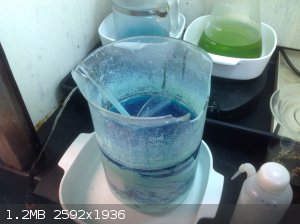 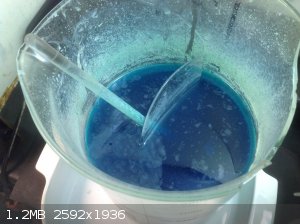 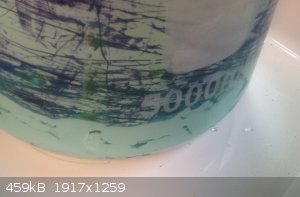
|
|
|
kadriver
Hazard to Others
  
Posts: 196
Registered: 7-11-2012
Location: United States
Member Is Offline
Mood: Thankful
|
|
Things have calmed down.
There is about 50$ worth of gold foils that I need to get out but I'm not sure how to proceed.
Tomorrow I'll decant the liquid, pick out the shards of glass (the glass saucer I had sitting on top also broke and fell down into the experiment)
then transfer to a new container so I can carry on the experiment.
I have no idea what the blue precipitate is. I'll get some samples and start running some tests to see if I can find a solvent that will dissolve the
light blue ppt but leave the gold foils.
I have never encountered this type of material, any thoughts on what it might be and how I can dissolve it?
Thanks, kadriver
|
|
|
deltaH
Dangerous source of unreferenced speculation
    
Posts: 1663
Registered: 30-9-2013
Location: South Africa
Member Is Offline
Mood: Heavily protonated
|
|
Sorry to hear about your disaster.
Sounds like the precipitate may contain copper salts. You ought to be able to wash these through a strainer/sieve and retain your gold fingers. After
that I suggest filtering the solutions so you can keep the filtrate for the next batch and recover the precipitate.
The precipitate should dissolve in conc. HCl if it doesn't dissolve well in water alone. You might want to try dissolving a small amount in saturated
sodium chloride as well to see if that works, it's more benign than conc. HCl and cheaper! If it contains copper(I) in the mix, then that won't be
very soluble in water alone.
[Edited on 5-10-2015 by deltaH]
|
|
|
violet sin
International Hazard
    
Posts: 1484
Registered: 2-9-2012
Location: Daydreaming of uraninite...
Member Is Offline
Mood: Good
|
|
might ammonia re-dissolve the copper compound to filter out gold fingers? that is if it is a copper salt we are seeing as the blue ppt.
|
|
|
deltaH
Dangerous source of unreferenced speculation
    
Posts: 1663
Registered: 30-9-2013
Location: South Africa
Member Is Offline
Mood: Heavily protonated
|
|
Quote: Originally posted by violet sin  | | might ammonia re-dissolve the copper compound to filter out gold fingers? that is if it is a copper salt we are seeing as the blue ppt.
|
Oooh, that's going to get really pretty, pretty fast  Nice idea! Nice idea!
[Edited on 5-10-2015 by deltaH]
|
|
|
Little_Ghost_again
National Hazard
   
Posts: 985
Registered: 16-9-2014
Member Is Offline
Mood: Baffled
|
|
blimey that must be strong stuff! looks a bit like this
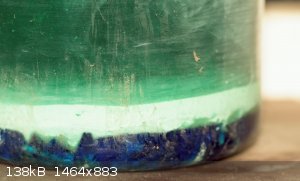
Mine is copper disolved in nitric and sulphuric acid (both conc), so I would say thats copper for sure. Then again I am often wrong 
mine been there so long the dark blue on the bottom is crystals! what struck me is how similar the white powder was and how it sticks to the sides of
the glass
[Edited on 5-10-2015 by Little_Ghost_again]
How much did it evaporate? I only ask because you said about the plate on top, I am wondering if your white powder is salt? but the blue looks like a
fair bit of copper
[Edited on 5-10-2015 by Little_Ghost_again]
Dont ask me, I only know enough to be dangerous
|
|
|
kadriver
Hazard to Others
  
Posts: 196
Registered: 7-11-2012
Location: United States
Member Is Offline
Mood: Thankful
|
|
Quote: Originally posted by deltaH  | Sorry to hear about your disaster.
Sounds like the precipitate may contain copper salts. You ought to be able to wash these through a strainer/sieve and retain your gold fingers. After
that I suggest filtering the solutions so you can keep the filtrate for the next batch and recover the precipitate.
The precipitate should dissolve in conc. HCl if it doesn't dissolve well in water alone. You might want to try dissolving a small amount in saturated
sodium chloride as well to see if that works, it's more benign than conc. HCl and cheaper! If it contains copper(I) in the mix, then that won't be
very soluble in water alone.
[Edited on 5-10-2015 by deltaH] |
I noticed the precipitate in very small volumes starting on day two with the bubbler. On day five it exploded exponentially and started to coat the
inside of the beaker.
I have some extra fine copper mesh that might work as a strainer. Also a steal tea strainer that has a fine mesh. Straining out the foils and rinsing
the ppt through never occurred to me - thanks for that tip.
As for ammonia, I try to keep it out of my processes. It will dissolve silver chloride and that can be useful. But adding it to waste treatment
creates a plume of ammonia that is ruinous to equipment and lungs.
I'll get a sample of the blue precipitate and try a few drops of ammonia to see if it will dissolve the copper salt.
I started filming for this video at the beginning. But I usually try to produce the video as the process is going in real time to keep everything
fresh. I can do this because I am very familiar with the process and I know what's going to happen next.
But with this I am in unfamiliar territory. I stopped shooting video when the precipitate showed up. Couple that with the broken beaker and it's not
looking good for completing this experiment - on video.
I'll probably get the foils from this batch and start the experiment over, being more familiar with what to expect. THEN do a video showing the
complete process.
I'll keep this thread posted on how I proceed from here with photos, but probably not a video this time around.
kadriver
|
|
|
kadriver
Hazard to Others
  
Posts: 196
Registered: 7-11-2012
Location: United States
Member Is Offline
Mood: Thankful
|
|
Quote: Originally posted by Little_Ghost_again  | blimey that must be strong stuff! looks a bit like this
Mine is copper disolved in nitric and sulphuric acid (both conc), so I would say thats copper for sure. Then again I am often wrong 
mine been there so long the dark blue on the bottom is crystals! what struck me is how similar the white powder was and how it sticks to the sides of
the glass
[Edited on 5-10-2015 by Little_Ghost_again]
How much did it evaporate? I only ask because you said about the plate on top, I am wondering if your white powder is salt? but the blue looks like a
fair bit of copper
[Edited on 5-10-2015 by Little_Ghost_again] |
I always try to keep a cover of some sort on the beaker. I did not note the amount of evaporation.
I must say that the concept of using vinegar, salt and peroxide is fantastic, the formation of the blue ppt really throws a wrench into the gears of
this process. I didn't expect it.
kadriver
|
|
|
deltaH
Dangerous source of unreferenced speculation
    
Posts: 1663
Registered: 30-9-2013
Location: South Africa
Member Is Offline
Mood: Heavily protonated
|
|
Okay, some detective work is in order then.
I must say, I'm doubting that this precipitate is copper(I) now considering that it took so long to form and then formed exponentially. That doesn't
fit. If anything, prolonged bubbling should oxidise all the copper (I) to copper (II), which I think it did and that is the blue solution you see,
especially after [presumably] all the copper has been leached.
The precipitate is something else, could it be tin oxide and/or lead salts from solder?
[Edited on 5-10-2015 by deltaH]
|
|
|
Little_Ghost_again
National Hazard
   
Posts: 985
Registered: 16-9-2014
Member Is Offline
Mood: Baffled
|
|
I asked about evaporation because I wondered if the white stuff was salt or maybe lead something. Then again he used fingers I think, so should be no
lead as it should be the copper the glue the gold and the stuff they put on top like a varnish (the name escapes me).
How do I make the acetate? mine hasnt turned up.
I am eager to give this another try
Dont ask me, I only know enough to be dangerous
|
|
|
deltaH
Dangerous source of unreferenced speculation
    
Posts: 1663
Registered: 30-9-2013
Location: South Africa
Member Is Offline
Mood: Heavily protonated
|
|
What do your mean by "how do I make the acetate"?
|
|
|
aga
Forum Drunkard
    
Posts: 7030
Registered: 25-3-2014
Member Is Offline
|
|
The fact that PCBs have a lot of copper on them surely suggests the blue is a copper salt ?
Also it's Blue ...
|
|
|
Little_Ghost_again
National Hazard
   
Posts: 985
Registered: 16-9-2014
Member Is Offline
Mood: Baffled
|
|
Sorry was a mix up ignore that.
Dont ask me, I only know enough to be dangerous
|
|
|
Little_Ghost_again
National Hazard
   
Posts: 985
Registered: 16-9-2014
Member Is Offline
Mood: Baffled
|
|
Quote: Originally posted by aga  | The fact that PCBs have a lot of copper on them surely suggests the blue is a copper salt ?
Also it's Blue ... |
I think the detective stuff is more to do with the white powder, there is alot of it. Could be copper(I) but I am guessing that would be unlikely. The
blue as you say has to be copper, and a fair bit going by the colour, if he added alot of conc H2O2 then maybe the white stuff is copper(I)??
I am pretty sure it wont be lead etc as these were fingers, so unless a fair number had some soldering done to them I cant see lead being in there,
that leaves the glues and coatings, depending on the number of layers of the boards used that could be a fair bit. I havnt got a clue what they use as
a bonding material.
The only other way out idea is maybe the glass fiber resin came out and created the white precipitate. But judging it against mine (whatever that is)
it seems to be the same white powder, I am pretty sure mine is copper of some sort as it only had copper and acids added
Dont ask me, I only know enough to be dangerous
|
|
|
kadriver
Hazard to Others
  
Posts: 196
Registered: 7-11-2012
Location: United States
Member Is Offline
Mood: Thankful
|
|
Quote: Originally posted by Little_Ghost_again  | | Then again he used fingers I think, so should be no lead as it should be the copper the glue the gold and the stuff they put on top like a varnish
(the name escapes me). |
I did used trimmed clean fingers. I think the green coating is called "solder mask".
I got some more photos to post as soon as my PC updates the virus scan.
|
|
|
kadriver
Hazard to Others
  
Posts: 196
Registered: 7-11-2012
Location: United States
Member Is Offline
Mood: Thankful
|
|
The strainer worked nicely. probably let some of the tiny pieces of gold foils through. But as you can see most are in the strainer!
I was at a loss on how to proceed. Many thanks to deltaH for suggesting the strainer.
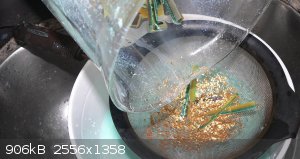
|
|
|
kadriver
Hazard to Others
  
Posts: 196
Registered: 7-11-2012
Location: United States
Member Is Offline
Mood: Thankful
|
|
After getting the foils in the strainer and rinsing the precipitate off into the small bucket, I collected all the foils in a big bucket of water
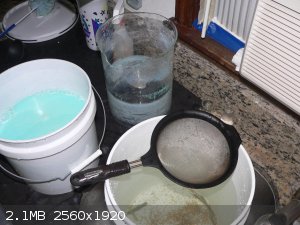
|
|
|
kadriver
Hazard to Others
  
Posts: 196
Registered: 7-11-2012
Location: United States
Member Is Offline
Mood: Thankful
|
|
Here is all the foils ready to dissolve. Thanks for helping me with this. If not for the suggestions I received here it would still be sitting there
untouched and broken!
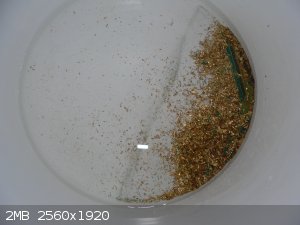
|
|
|
kadriver
Hazard to Others
  
Posts: 196
Registered: 7-11-2012
Location: United States
Member Is Offline
Mood: Thankful
|
|
I filtered out the foils and placed them and the filter paper into a 600ml beaker.
I adding about 100ml HCl then adding about 10ml houshold bleach in my fume hood. The foils dissolved in just a few minutes, the filter paper
disintegrated.
I then filtered the filter paper and other solids out so I had a clean solution of gold bearing liquid.
I added a couple of spoons of sodium meta bisulfite and the gold precipitated. see photo.
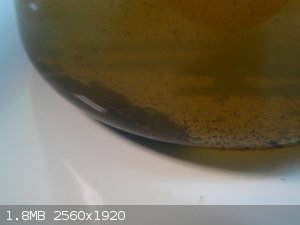
|
|
|
kadriver
Hazard to Others
  
Posts: 196
Registered: 7-11-2012
Location: United States
Member Is Offline
Mood: Thankful
|
|
It was getting late. I'll let the gold settle overnight then collect the gold powder in a filter paper, melt it and post the yield tomorrow.
AGAIN, many thanks for helping me through this. The precipitate threw me for a loop.
Now that I have some time and am familiar with the process i'll make a video and post it on youtube, then add it to this thread.
kadriver
|
|
|
aga
Forum Drunkard
    
Posts: 7030
Registered: 25-3-2014
Member Is Offline
|
|
Brilliant stuff kadriver - Success !
Just think : your video will show how to replace the conc nitric acid currently used in the process, and eliminate an awful lot of seriously toxic
fumes, maybe even save a few lives.
|
|
|
deltaH
Dangerous source of unreferenced speculation
    
Posts: 1663
Registered: 30-9-2013
Location: South Africa
Member Is Offline
Mood: Heavily protonated
|
|
Yes, very nicely done kadriver and thanks so much for scaling up! Death to HCl!  Death to nitric! Death to nitric!  
[Edited on 6-10-2015 by deltaH]
|
|
|
| Pages:
1
2
3
4
5
6
..
9 |